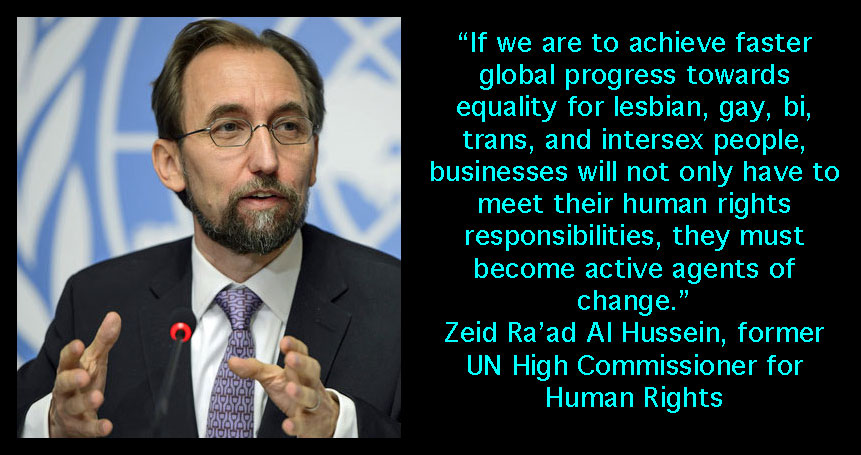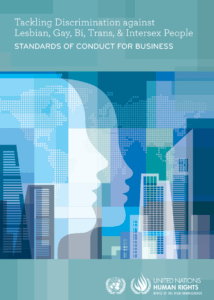Economics of human rights: Working for change is good for business
Colin Stewart is a 45-year journalism veteran living in Southern…
Businesses have the responsibility — and the clout — to work to end discrimination and criminalization of LGBTI people.

By Nikola Davis
In the increasingly globalized world economy, corporations are gaining an unprecedented level of power and influence — economic, political, and social. Not only do corporations have a significant impact on domestic and international economies, but they also play an important role in the shaping of human rights and can bring about positive social change in communities where they operate.
Businesses worldwide — no matter their size — have the ability to promote equality for all, including for the LGBTI community, through their relationship with an array of stakeholders. Multinational corporations especially often have access to legislators and politicians in countries where the LGBTI community faces discrimination or is criminalized.
Even though the protection, respect and fulfillment of human rights is the primary responsibility of governments, companies have a responsibility to respect human rights in their operations and business relationships. In countries where the law does not protect LGBTI people, businesses must do even more to shield employees and customers from discrimination.

Built on the concept that businesses have responsibility for respecting human rights, the UN Human Rights Office in 2017 published global standards for business to tackle discrimination against LGBTI people. These Standards of Conduct provide guidelines for companies on how to respect and support the rights of LGBTI people in the workplace, marketplace, and community.
The standards are built on existing internationally recognized human rights to which LGBTI people are entitled as well as on several good practices that responsible businesses have already adopted. Importantly, they aim at encouraging positive interactions between companies and a wide array of stakeholders — staff, customers, suppliers, shareholders, communities, governments, lawmakers, and trade unions — because to achieve positive change, we all need to work together.
The standards call on businesses of all sizes to:
- Prevent harassment and discrimination directed against LGBTI people.
- Allow LGBTI employees to work with dignity.
- Hold employees accountable if their conduct abuses others’ human rights.
- Take every available legal step to question, challenge, delay, and resist implementing government orders that might lead to human rights violations, including human rights violations against LGBTI people.
Costs of discrimination against LGBTI people
There is moreover an economic case for decriminalization. Studies show that discrimination against specific groups of people, including the LGBTI community, results in heavy costs such as shrinking the talent pool, constricting markets, and acting as a drag on economic growth. Human Dignity Trust’s paper Homosexuality and International Business: The Economic and Business Cases for Decriminalization found that:
- “LGBT inclusion is associated with countries which attract higher levels of foreign direct investment.”
- “LGBT discrimination may inhibit local companies from connecting to global markets.”
- “LGBT discrimination results in ‘brain drain’ – the emigration of talented and skilled individuals.”
- “LGBT discrimination can shape perceptions on a world stage with a negative impact on tourism.”
In 2014, World Bank researchers in India concluded that discrimination against LGBTI Indians cost the country up to 1.7 per cent in potential GDP (equivalent to $31 billion).
Purchasing power of the LGBTI community and its allies
The purchasing power of the LGBTI community provides a further argument for decriminalization. In 2016, LGBT Capital estimated the global spending power of the LGBTI community to be $3.6 trillion annually. In 2015, Open for Business, a coalition of global companies making the case that inclusive, diverse societies are better for business and better for economic growth, surveyed attitudes of U.S and U.K consumers towards companies operating in countries with an anti-LGBTI agenda and found that:
- Nearly half (47.5%) would support a boycott of companies working in countries that have anti-gay laws.
- More than half (52.5%) say they would be unlikely to support international development aid going to a country that has anti-gay laws.
- More than half (52%) would be unlikely to work for a company that does business in a country that has anti-gay laws.
- 42.5% would be unlikely to buy a product from a country that has anti-gay laws.
- More than half (51%) would be unlikely to go on holiday to a country that has anti-gay laws.
Power of corporations to bring about a positive change.

On February 2014, Ugandan President Yoweri Museveni signed into law the Uganda Anti-Homosexuality Act 2014, which threatened a life sentence for anyone convicted of gay sex. Although the law was opposed by gay rights activists and many Western governments, Museveni said that the most persuasive opposition came from Uganda’s business partners.
Richard Branson, the founder of Virgin Group, declared that Virgin would no longer do business in the country. Barclays, Citibank and other companies expressed their concerns directly to the Ugandan government. Woolworths, a South African food and clothing retailer, declared that “All Woolworths stores in Uganda and elsewhere remain open to talent of all races, cultures, beliefs and sexual orientation.”
Responding to the backlash from the corporate world, Museveni stated:
“To carelessly and needlessly open unnecessary wars with such useful customers is irresponsible to say the least. …. The issue now is, therefore, not what other governments are telling us. It is about us deciding what is best for our country in the realm of foreign trade, which is such an important stimulus for growth and transformation that has no equal.”
He declared that Uganda had no problem with cuts in development aid nor with criticism from other governments. The serious problem, he said, was “the possibility of trade boycott by Western companies.”
In August 2014, the Uganda’s Constitutional Court overturned the anti-gay law, ruling that parliament had passed it without the necessary quorum being present.
Consumers have the power to bring about change
Sure, corporations have the power to shape policies but their behaviour is often influenced by pressure from consumers. Citibank and Barclays condemned the Uganda Anti-Homosexuality act but not before Collin Burton, a gay Citibank customer from Washington, D.C., launched a petition on Change.org calling on Citibank and Barclays to condemn the law. That petition attracted more than half a million signatures (579,869).
For more information:
- Tackling Discrimination against Lesbian, Gay, Bi, Trans, & Intersex People: Standards of Conduct for Business (September 2017, Office of the UN High Commissioner for Human Rights)
- The Relationship between LGBT Inclusion and Economic Development: An Analysis of Emerging Economies (November 2014, Williams Institute)
Nikola Davis, the author of this article, holds a degree in International Human Rights Law. Her interests lie in the role corporations play in domestic and international economies and the impact of business on human rights. Nikola was born in what is now Slovakia. She also lived in the Czech Republic, Ireland and spent time in Nicaragua and Honduras. She lives with her husband in Portland, Oregon, U.S.A.
More context:
- 74 countries where homosexuality is illegal
- 1000s who died in anti-gay, anti-trans attacks (updates)
- 100s are in prison for being gay
- 14 nations have death penalty for gay sex; 5 carry it out
- 21 varieties of traditional African homosexuality
- 35 Commonwealth nations have laws against gay sex





Excellent article and great sources for additional information.
Well done!